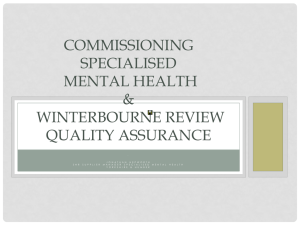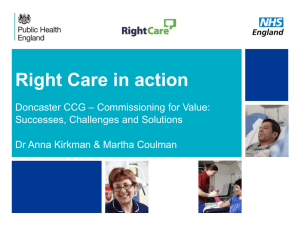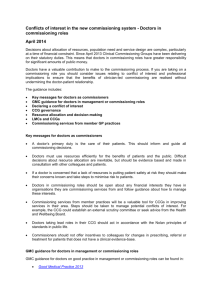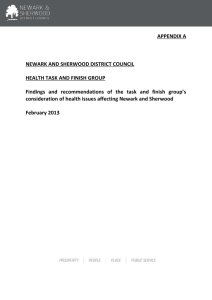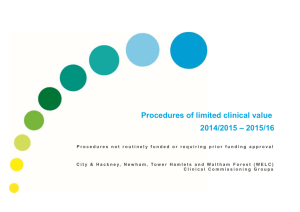NHS Budget Proposals
advertisement
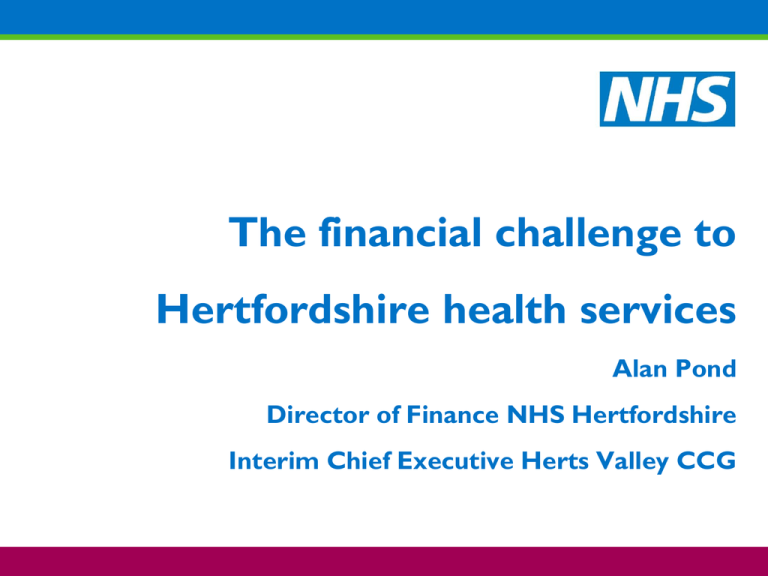
The financial challenge to Hertfordshire health services Alan Pond Director of Finance NHS Hertfordshire Interim Chief Executive Herts Valley CCG Commissioning for Patients – future funding flows • Groups of GP practices will commission most local NHS services • Two Shadow Clinical Commissioning Groups (CCGs) in Hertfordshire • Herts Valleys CCG • East & North Herts CCG • The new national NHS Commissioning Board will commission GP, dentistry, pharmacy and ophthalmic services, specialised services and prison health services Commissioning for Patients Clinical Commissioning Groups • Will be statutory bodies with own senior staff • All practices must be part of a CCG • NHS Commissioning Board will support by developing commissioning guidelines, model contracts and tariffs • CCGs will be able to employ staff directly or buy in services from external organisations • CCGs can decide which aspects of commissioning activity they undertake themselves and which aspects they share • Hertfordshire Integrated Commissioning Support Service being developed to support CCGs Commissioning for Patients Finance • The NHS Commissioning Board will initially calculate practice-level budgets from the current PCT budgets and allocate these resources directly to CCGs • New weighted capitation formula will provide target allocations for each CCG • Pace of change policy will drive how quickly funding is moved to get CCGs to their target • Commissioning budget will be separate from surgery income • CCGs will receive a maximum management allowance to directly employ staff or buy in services. Indicative amount is £25 per head • Details on how any over/underspends will be managed is yet to be agreed with the DH and the Treasury Commissioning for Patients Proposed implementation timetable In 2012/13 • CCGs formal committees of NHS Hertfordshire Board • Formal establishment of CCGs and NHS Commissioning Board • Approvals process for CCGs in phased approach • CCGs receive indicative budgets and must prepare commissioning plans In 2013/14 • CCG statutory bodies and where authorised will receive funding allocation and hold contracts Transparency in outcomes • NHS targets focus on measuring outcomes • New outcomes framework for 2012/13 created • Framework to be structured around five areas: 1. 2. 3. 4. 5. Preventing people from dying prematurely Enhancing the quality of life for people with long-term conditions Helping people to recover from episodes of ill health or following injury Ensuring people have a positive experience of care Treating and caring for people in a safe environment and protecting them from avoidable harm There are over 500 performance indicators which the PCT is responsible for reporting on (by provider and by CCG/PCT) Transparency in outcomes 2 • NHS Operating Framework – Key Priorities 1. 2. 3. 4. Dementia and care of older people Carers Military and Veterans Health Health visitors and family nurse partnerships • SHA Ambitions • • • • • Eliminate pressure ulcers Every patient contact counts Quality/Safety in Primary Care Strengthened NHS/Local Government partnerships Improve patient experience QIPP – Financial Context • White Paper sets out £20bn efficiencies over next 4 years Size of QIPP Challenge £276m • Links to Operating Plan, Framework & Outcome Framework Projected Expenditure Without QIPP Projected Funding Financial Picture – 2012/13 1. Hertfordshire system in balance at 31st March 2012 2. Managed to deliver circa £100m efficiencies in 2011/12 across Hertfordshire 3. Funding used non-recurrently to drive change and deliver efficiencies 4. PCT funding for 2012/13 £1.76bn 5. Significant challenge across the system in 2012/13 to 2014/15 and beyond… Financial Picture – 2012/13 Illustration of how the PCT income is spent (2010/11) Maintaining Performance Managing Change • Set out the vision – DQHH puts Hertfordshire ahead of other areas • Created early momentum, delivered first year of QIPP • Minimise fear to avoid distraction • Prioritise performance areas to concentrate on • Dedicated resource for transition • Talent management


